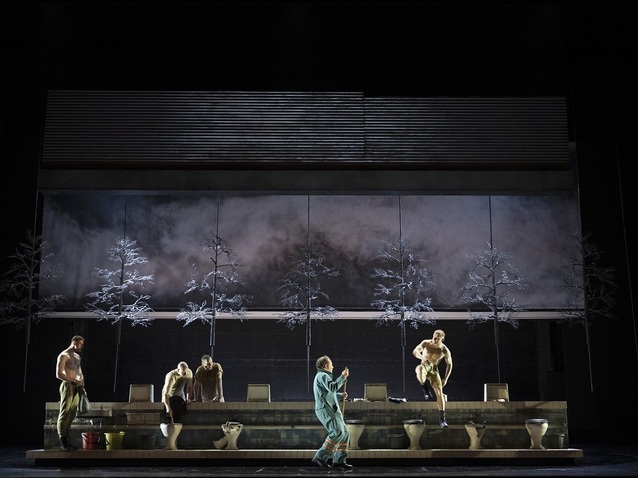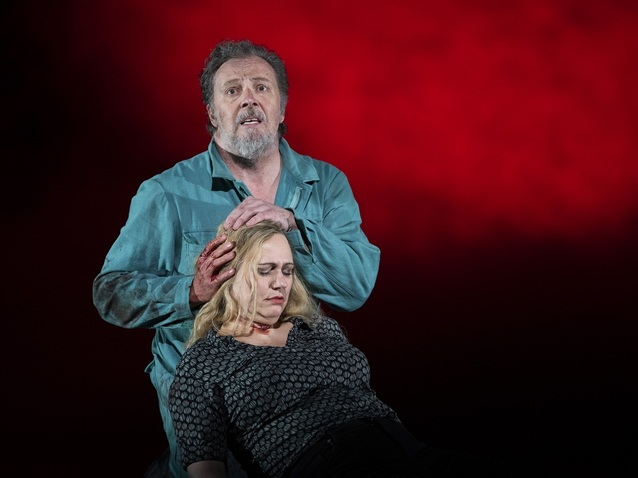 © Tristram Kenton
© Tristram Kenton
Alban Berg’s first opera Wozzeck, written between 1914 and 1922 before premiering in 1925, is generally regarded as the first opera to be produced in the twentieth century avant-garde style. It represents one of the most famous examples of atonality and also features some Sprechstimme, an expressionist vocal technique that sits between singing and speaking. The story is based on Georg Büchner’s play Woyzeck, which was left incomplete when he died in 1837. From the fragments of the unordered scenes that he left, Berg selected fifteen to create an opera of three acts with five scenes each, and adapted the libretto himself.
Exploring themes of militarism, callousness, social exploitation and casual sadism, the story considers the lives of soldiers and normal townsfolk in a rural German-speaking town. It specifically focuses on the degradation and demise of Wozzeck, a destitute soldier who is abused by his Captain, experimented on by a Doctor, and wracked with suspicion that his partner Marie is being unfaithful with a Drum Major. All this drives him to such a point of desperation that he ends up murdering Marie and then drowning himself, leaving their son all alone in the world.
If atonal music might be seen as the perfect vehicle for conveying a person’s dehumanisation and descent into madness, Deborah Warner’s new production for the Royal Opera proves equally adept at playing out both the psychology and drama of the work. There is more than a touch of the Brechtian about the staging as each of the many scene changes feels obvious, but also carries its own sense of poetry. At the end of each scene a screen or curtain is dropped, behind which the change takes place, but because this does not cover the entire stage we still witness props being put into place. In addition, because the screen is transparent, we see objects in silhouette moving on a turntable, and these create aesthetically pleasing images in their own right.

Wozzeck, ROH 2023 © Tristram Kenton
Although the staging tends towards the abstract in some respects, a sense of time and place is conveyed through a series of recurring ‘motifs’. In Hyemi Shin’s sets, delicate hanging trees frequently appear, providing a glimpse of nature amidst the turmoil and tawdriness of the world that Wozzeck inhabits. There feels something cyclical about ‘columns’ of buildings descending every time we are taken to Wozzeck and Marie’s dwelling, while the low walls of ‘corrugated iron’ that form the backdrop to the Captain and Doctor’s main encounter are mirrored in the scene in Wozzeck’s barrack, where the walls are of the same height.
Although Wozzeck’s state of mind is undoubtedly a product of the poverty and degradation that he experiences, Warner also suggests that these come to a head at a time when he is experiencing a mid-life crisis. This is vividly shown at the start when Wozzeck is revealed to be mopping up dirty latrines surrounded by younger, more virile soldiers. The first scene between him and the Captain actually takes place here, and if it might initially appear as if too much is being introduced, since silent action is presented in this space before the music even begins, what follows is perfectly pitched. When a man uses a urinal during the scene it is sufficient to suggest a real world in which people go about their business and Wozzeck counts for little, but not enough to distract from the central encounter.

Christian Gerhaher (Wozzeck), Anja Kampe (Marie) © ROH 2023
There is an enormous attention to detail as projections at the back of the stage reveal the fire that Wozzeck thinks he sees, and the red moon that Marie describes rising. Similarly, having Wozzeck’s meeting with the Doctor take place where the latter is planning to conduct an autopsy reveals his preoccupation with science and experimentation, and his callous and casual attitude towards the patient himself. The scene between the Captain (Peter Hoare) and Doctor (Brindley Sherratt) is particularly effective by virtue of two first rate performances. In the case of both people, the quality of their acting matches their singing so that they show how both characters are ultimately in the same men’s club. True, the Captain takes the Doctor’s warnings of death seriously, and self-importantly contemplates the mourning at his own funeral, but his own arbitrary fears contrast starkly with Wozzeck’s far more serious neuroses, thus revealing the class system that is at play.
There are a wealth of excellent performances from the cast, including Clay Hilley as the Drum Major, Rosie Aldridge as Margret and Sam Furness as Andres, but Anja Kampe’s portrayal of Marie is especially heartfelt and moving. Christian Gerhaher is superlative in the title role, combining impeccable phrasing with increasingly impassioned singing that perfectly captures the soldier’s deteriorating state of mind. In the pit, Sir Antonio Pappano reveals an intricate understanding of the score so that lines are always delineated to maximum effect, and the music brings out the action and drama at every turn.
By Sam Smith
Wozzeck | 19 May - 7 June 2023 | Royal Opera House, Covent Garden
the 21 of May, 2023 | Print
Comments